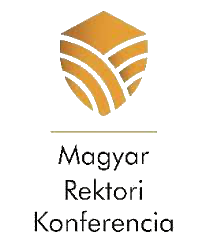MAGYAR REKTORI KONFERENCIA (MRK)
The Hungarian Rectors’ Conference was established 30 years ago and represents all HEIs in the country. Its primary task is torepresent the higher education institutions and to protect their interests in any issue with relevance to higher education at nationaland international level. In this respect HRC manages the elaboration of proposals on legislative provisions, coordinates thediscussion processes to form common positions of the Hungarian higher educational sector on significant HE issues. As a resultof these activities HRC is a determinant actor in shaping relevant national public policy. Besides protecting HEIs interests HRC facilitates the international collaboration of its members through several channels:
- By means of full membership in the European Association of Universities (EUA) and the International University Association(IAU) HRC plays an active role in the realization and improvement of the internationalisation strategies of the Hungarian HEIs.
- In the framework of professional working groups of EUA HRC is also forming perspectives of EHEA’s research and innovationactivities. Researchers and experts delegated by HRC to these working groups are involved in the newest developments of currentHE issues, and provide useful inputs to national HE principles.
- By participating in EU-funded projects with different kinds of scopes HRC contributes to the development of crucial fields ofEHEA, such as the enhancement of teaching quality in higher education, and addressing the present challenges of professionalhigher education (EFFECT, PROCSEE)
- HRC pursues constant dialogue with international partners, as a result of which mutually fruitful international collaborations areperformed. A good example of successful cooperation is the Brazilian scholarship program, Science Without Borders, in whichmore than 2000 Brazilian students learnt in Hungary under the umbrella of HRC’s coordinating and organizing activity.
MRK gained routine in participating in EU projects, and received many times positive assessment regarding the content it provides. Being a representative body of all the Hungarian higher educational institutions, MRK can involve experts of any scientific fields, in case of this project universities providing pedagogical degree programs, and especially the ones that pioneers in spreading modern pedagogical methodologies improving transversal skills. dr. Zoltán Dubéczi As the Secretary General of the Hungarian Rectors’ Conference, Dr Dubéczi has been working with a large number of national and international higher educational institutions since 2006, therefore he has an extensive experience in various fields of higher education, including legislation procedures, creating statutory proposals, managing scholarship programmes, and enhancing internationalization. In addition to his current work at the HRC, in 2013 Dr Dubéczi used to be the Chairman of the Secretary Generals’ Committee at the European University Association, from March 2014 he is the chairman of the Supervisory Board at the Tempus Public Foundation, and from January 2015, he is the Director for Education at the Central Bank of Hungary. He is an active presenter at international conferences and a recognised expert in workshops. In the past years, under his leadership at HRC, a great emphasis has been put on fostering internationalization in Hungary, with regards to incoming and outgoing student mobility, promotion of the Hungarian higher education and conclusion of agreements between nations. Due to his innovative solutions and engagement towards development, Hungary has achieved outstanding success in the Brazilian Science without Borders scholarship programme and has built fruitful relations with Latin-American and Asian countries. At the moment, Dr Dubéczi’s main focus is the enhancement of the role of the private sector in HE, and in a strategic level he is also taking part in the project PROCSEE, aiming at the development of PHE across Europe. Petra Perényi Ms Petra Perényi was the project manager of the EU-funded project “Digitalizing Educational Authority's Public Administration Processes”, budget of cca. 2M euros, between December 2009 and March 2013, and thus gained project management skills for EU-funded projects. She was also the national networks coordinator of the European Schoolnet (EUN) network, and the national networks coordinator of the Information and Communication Technology cluster (ICT cluster) operated by the European Commission’s Directorate General for Education and Culture, July 2007 – July 2012, throughout which Ms Perényi got to know the mechanisms of the collaboration in a wide network. Her current work at HRC covers both national and international related tasks, with a scope on the whole higher educational system, and with a special focus on European initiatives and projects. She was responsible for the project-related tasks in the project PROCSEE, aiming at the development of PHE across Europe, and the project EFFECT, aiming at the staff development in HEI-s, and presently responsible for UASiMAP project dealing with the regional commitment of the UAS institutions.







